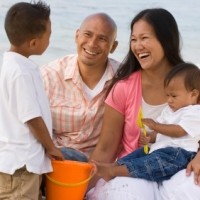Written by Julie Higginbotham, Senior Case Coordinator, Mecklenburg County CDSA
Summertime is a great time of year for doing all kinds of new things – families’ schedules tend to change some with older kids being out of school, days are longer, and there are lots of opportunities to support families in new routines. Vacations and family trips come up often in discussion, not just because of rearranging visits with providers, but also because travelling with kids can be stressful, and parents often spend a lot of time worrying about and preparing for whatever may happen. So many routines change when families travel, and thinking about them on the front end can make the experience more comfortable for everyone. Just because a family isn’t going to be at home doesn’t mean that there aren’t great chances to remember their priorities identified in their IFSP. So how does that conversation get started?
When providers meet with families during intervention sessions, best practices include starting and ending the visits with conversation – how have things been going since the last time you met, how is the week going so far, what things do you want to be trying out over the next week, etc.? When discussing upcoming new activities and routines, which may include family travels, here are some prompting questions that can help give the family some ideas to plan for a great trip together…..
- How is the family getting to their destination? This is a great place to start because travelling with young children isn’t easy, whether there are any underlying concerns or not. Talking about being in the car for a long time or addressing a child’s need for sensory input while on a plane can help families plan and think through how to deal with situations before they come up. If the team has already been addressing family mealtimes with a child that needs to move around, how can you incorporate strategies that have already been helpful that could also be used on a plane or in restaurants while traveling? If the baby in the family has reflux and has a specific routine for bottle feedings, how can this be built into the car trip?
- Where will the family be staying? Children sometimes have difficulty when they are in new environments – expectations are different, and this can affect many routines. For example, will the child be sleeping in her own bed in her own room, or will she be co-sleeping for the week? Who else is staying there, and how often does she see the extra people who will be around during vacation? Even thinking about whether there will be a high chair available can be impactful. Children who need to be more fully supported to eat safely have this need wherever they go. Spending time together to brainstorm the best supports for a child during meals can take a lot of frustration out of being in the moment on vacation. This doesn’t necessarily mean that the family needs to take a specialized chair with them, but they might want to pack a few extra baby blankets or use some pillows to build support into chairs that they can access while they’re away.
- What activities will the family be doing together while on vacation? Sometimes families that have infants and toddlers with disabilities may avoid certain family activities because they’re worried about how the children will tolerate it and whether their needs will interfere with others who are on vacation, too. Help the family think through what activities they would like to do as a family on vacation and coach the family through perceived challenges, and offer ideas on accommodations that may make the activity successful for the family. Maybe the family would like to go on a bike ride together, but they aren’t sure how their daughter will like riding in the carrier behind the bike. Perhaps the family is looking forward to relaxing on the beach, but their son might not like the texture of the sand or the movement of the waves in the ocean. Just planning around potential changes in nap time and mealtime can help a family find ways to adapt to new routines while away from home.
- As parents are packing and thinking about their trip, what are they thinking about when it comes to how everyone will adapt to being away from home? This is perhaps the most important question you can ask a family. They may not be worried about anything and are just looking forward to getting out of the house together! You don’t have to be troubleshooting anything to talk about how to maximize natural learning opportunities throughout the day that come up just because the family isn’t at home, but you may find that there’s a need for new outcomes to address concerns to make travelling more successful for everyone.
Being on vacation is a great time to really engage children and expose them to new experiences – seeing the ocean, swimming in the lake, and going out to dinner at different restaurants all offer opportunities to enjoy family time together. What are some things that have come up as you’ve talked to families about vacations? What have been the most common questions, and what questions have taken you by surprise? Share ideas that you’ve given families to help make their vacations a success, too!!!!






No comments yet.